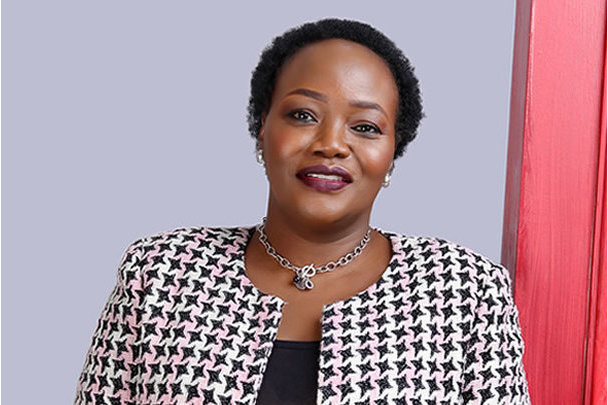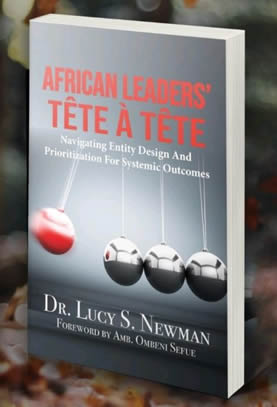Thoughts on entity design and systemic outcomes with Dr. Newman

Summary
If, as citizens or legal residents, we earn legitimate income, have a voice, are respected in our communities, and pay taxes, we are leaders.
In this interview, Lucy Surhyel Newman, DBA, author, policy advisor, and a certified performance technologist, provides insightful thoughts on leadership for transformational outcomes in Africa. She was interviewed by Jide Akintunde, Managing Editor, Financial Nigeria, and Director, Nigeria Development and Finance Forum.
Jide Akintunde (JA): Your new book, African Leaders' Tete-A-Tete: Navigating Entity Design and Prioritisation for Systemic Outcomes, is a recommendation for frank discussions with African leaders. What should citizens be telling these leaders?
Lucy Surhyel Newman (LSN): My new book doesn’t tell citizens what they should be telling leaders per say; rather, it unlocks the door for transformational leadership by providing compact, interactive, easy-to-follow, and real-life self-application of principles to attain systemic outcomes in Africa. This is addressed to leadership at the individual, corporate, and jurisdictional levels.
African Leaders’ Tete-A-Tete encourages frank discussions at multiple levels. The first of this is the leader looking within; find or expand one’s voice. This discovery of oneself is also applicable to leaders of corporate entities and institutions who seek to have a clearer articulation of how they could optimally operate and add value to host communities and economies, thereby establishing the corporate brand as a key stakeholder in society. Leaders of jurisdictions and cross-jurisdictions will also find it useful in enhancing their capacity to align with subregional and continental protocols and attain widespread, or systemic, outcomes.
For effective dialogue with leaders, I think the citizens and residents should have self-awareness and understanding that leadership is not always positional. If, as citizens or legal residents, we earn legitimate income, have a voice, are respected in our communities, and pay taxes, we are leaders. Citizens – especially those who are eligible to vote at general elections – should see themselves as ‘producers’ of value and the ‘employers’ of elected and appointed public officials. Rising to this state of mind is important. My book calls on African leaders that already have this self-awareness. 
JA: That is quite philosophical. At a general level, though, the question is: Is it that citizens have not been engaging their leaders or the leaders are simply not listening – by doing what the people want?
LSN: I think it is both. Citizens have been engaging, but without sufficient clarity, consistency, and gusto. The leaders have also not been listening effectively and continuously. Consequently, what they often hear is mostly discordant tunes. But this has been changing, since the Arab Spring, and, for example, the EndSARS protest in Nigeria. Across Africa, social media is bringing an awakening in the youth demographic. The younger people, Millennials and Gen Z especially, are better at stating exactly what they want, and they now form an increasing majority of the population.
Stress conditions, including insecurity, poverty, unemployment, and climate change, have triggered a survival mode in the people. I think African leaders will be wise to find ways of engaging people they lead. Town hall meetings, polls, surveys, road shows, crowdsourcing opinions, etc., are high value ways of getting feedback from the people. The feedback should be internalized, considered, and negotiated priorities should be acted on.
JA: From the standpoint of your expertise, and in line with your advocacy in your new book, what are the essentials for redesigning Africa’s public, private and social sector entities?
LSN: I intentionally titled the final section of the book ‘The Momentum’, where I dimensioned actions at multiple levels. I identified five actionable, quick-win takeaways at country-level. I hope these humble prescriptions will become part of mainstream discussion on the continent in the coming years within the auspices of the African Union’s Agenda 2063, whose phase two implementation starts off in 2023.
First, we need viable national data for evidence-based planning and decision-making. This can be produced from national census updated every decade, integrated national identity database, and credible quarterly socio-economic data. Second is a national constitution that reflects the wishes of the people and ratified by them – either directly or through their elected representatives. The existing constitutions should be validated and updated through this process, preferably once a decade, as already being practiced by some African countries; it will be nice if this becomes an ‘African practice’.
Third, we have to develop contemporary economic activity clustering policies that are efficient and futuristic. The aim is to minimise duplication of governmental roles in Ministries, Departments and Agencies, provide higher transparency, improve market regulation, boost the private sector, empower the civil society, and remove public sector monopolies or undue interference in the marketplace.
Fourth is a reward system that recognises performance and sanctions unacceptable behaviours in the private, public, and social sectors. The final one is enabling independent institutions to function as they should.
JA: I suppose one of the outcomes you would like to see from individual, political, and corporate leadership redesign on the continent is gender equity. Given that the IWD 2023 was celebrated only last month with the theme #EmbraceEquity, what message do you have on fostering gender equity in Nigeria and in other African countries?
LSN: The 2022 Global Gender Gap Index (GGI) of the World Economic Forum (WEF) highlights a sobering deviation from the affirmative action agreed at the Beijing Conference of 1995, a significant turning point for global agenda for gender equality. My message on the occasion of IWD 2023 was that we must commit to closing the gender gap by taking practical steps in our spheres of influence. We have to crowd-in progress from multiple quarters and not just the governments. We have to consciously celebrate women who are forging change in society. At the same time, we have to continue to call out inequity against women in society.
JA: I want to further explore the theme of your book. The fundamental way to engage political leadership is through citizens’ participation in leadership selection – specifically through voting at elections, and the leaders know this. Given the uncomplimentary views about the Nigerian 2023 presidential election, is it design or practice – or both – that still dog our leadership selection?
LSN: Nigeria’s political leadership selection process over the past 24 years has been quite expensive and dogged by multifaceted issues that, in my view, are both legacy design and practice in nature. Nevertheless, there is now a demographic shift in the voting population, amidst citizen awakening and impatience with the status quo. The global media, especially social media, have been a catalyst in the emerging shift. The process is more likely to entrench.
It is, however, worthy to note that we have done fairly well with some design instruments, including the Not Too Young To Run Act of 2018 and the Electoral Act 2022. The 2023 general election was a litmus test for the new electoral law. However, as gloomy as the immediate outcomes of the elections have been – and we do acknowledge that there were some encouraging outcomes, too – I believe this situation can be improved upon. It is possible to carry the momentous interest in the 2023 election as a continuum, into the next cycle in 2027. While 2023 showed, in some cases, sheer clamouring for change of party platforms and broad-based questioning of political philosophies, we need to become increasingly very selective in our review of aspirants and require that they have sellable vision, capacity, competence, and character.
Our democracy has to become more participatory. People should be able to vote over a few days, given the size of both the country and the population as well as the nature of physical terrains. To encourage participation, I recommend that voter registration should be all year round and continuous. Entity design of the electoral empire designated institution and personalities of its principals should boost public confidence and trust, optimise political party registration, voter registration, election operations, as well as election result collation and reporting. Lastly, the role of independent media in scrutinising (aspiring) leaders and educating the public on best practice in a democratic system should be much more rigorous than we have seen so far.
JA: What is your message to Africa’s business leaders, given the evolution that is taking place in both business and the workplace as the world strives for sustainable development?
LSN: This is an area my advocacy work has focused since 2020. Apart from my book, I have recently written two articles on this subject in The Director Magazine, published by the Nigerian Institute of Directors and published a book chapter each, in two separate global professional manuals by IGI Publishing, in collaboration with some of my mentors at the International Society for Performance Improvement [ISPI]. There are key developments highlighted to help shed light on the changing horizon. The African Private Sector Summit (APSS) is advocating for the enactment of the Private Sector Bill of Rights (PSBoR), as a valuable tool for effective participation of the African private sector in pursuit of the objectives of the African Continental Free Trade Area (AfCFTA), as a collective path to AU’s #TheAfricaWeWant.
Also, many major African stock exchanges have adopted or are on the verge of adopting the International Financial Reporting Standards (IFRS) with requirements of integrated reporting by listed entities. Many African jurisdictions now have National Corporate Governance Frameworks and Codes which place a premium on Environment, Social, and Governance (ESG) principles. I would also like to highlight that entities like the African Peer Review Mechanism (APRM), a specialised agency of the African Union, is working hard toward universal ascension as a peer self-assessment and experience sharing tool for African countries.
Based on these developments and platforms amongst others, I think it is sunrise for African businesses. The business environment and practices are set to dramatically improve. My advice is that the businesses should continue to form networks of impact within the communities where they operate and across the continent.
JA: Are you optimistic that we can put Africa on a path of sustainable, systemic outcomes, to borrow from the title of your book?
LSN: Absolutely yes! The world is witnessing the dawn of a new geopolitical order. Climate change and other risks are also creating new opportunities for investment. Africa can position itself and benefit from multiple partnerships. But, by far, the greatest asset is our youthful population.
JA: Where can one buy a copy of your new book – hoping it is affordable?
LSN: (Laughs). Yes, it is affordable. My publishers and I were careful about pricing. That is why the book exists in eBook, paperback, and hard cover formats. Some started with the eBook, then decide to go for hardcover when they saw the value and wanted to keep the book handy.
In terms of where to get it, it is available on print-on-demand basis and as an eBook on Amazon Global, with additional eBook sales on four digital platforms – Apple Books, Kindle, Googlebooks, and Kobo – to enhance easy global access to Africans in diaspora especially, and the global reading public. Within Nigeria, it is available from Roving Heights Bookstore outlets. All these details, including an author interview on various aspects of the book, are on my personal website – www.drlsnewman.com/books.
Recent Interviews
Latest Blogs
- How Tinubu is ensuring equitable access to public services
- Nigeria’s economic reform faces new threats
- What Ould Tah’s tenure at BADEA reveals about his AfDB candidacy
- Implementation strategy crucial for the success of 12-4 education policy
- A senator’s suspension threatens the right of representation
Latest News
- IMF warns of global public debt approaching 100 percent of GDP
- Rise in vaccine-preventable disease outbreaks is a threat, warn WHO, others
- Nigeria records $6.83 billion balance of payments surplus in 2024
- Soaring civil unrest worries companies and insurers, says Allianz
- Tariffs stir inflation fears in US but offer targeted industry gains ...













